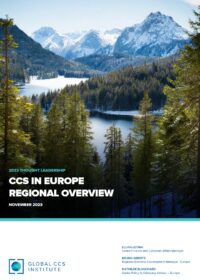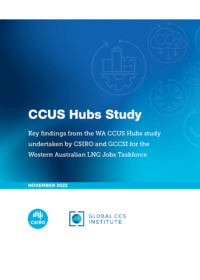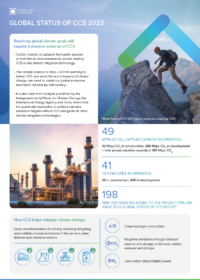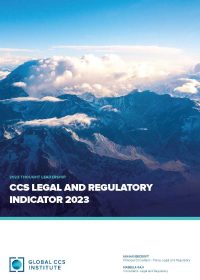Resources
Publications
Our publications, reports and research library hosts over 500 specialist reports and research papers on all topics associated with CCS.
View our Publication Library Disclaimer.
Filter by
Titled “COP 29 Half-Time: CCS Developments in International Climate Change Policy”, read the Institute’s latest publication highlighting the outlook for carbon capture and storage on the international stage.
Globally, carbon capture and storage (CCS) technology is being increasingly recognised as a needed climate change mitigation tool, and the outcomes, discussions and negotiations at the UNFCCC Bonn Climate Change Conference has steadily begun to reflect that.
The Bonn Conference serves as a half-way point ahead of COP – which is set to be held in Baku, Azerbaijan this November – and consists of intense negotiations on a range of key climate issues where alignment, resolutions and progress are sought. Top of the agenda this year at Bonn was climate finance, along with discussions on NDC progress and linkages with technology development.
Authored by the Institute’s Senior International Climate Change Policy Lead, Noora Al Amer, read this brief for the latest highlights on:
- CCS related outcomes following the Bonn Climate Change Conference
- Key international multi-lateral agreements that will shore up CCS further
- An outlook on the COP29 Presidency and beyond
- Key recommendations
Disclaimer
The content within the Global CCS Institute Publications, Reports and Research Library is provided for information purposes only. We make every effort and take reasonable care to keep the content of this section up-to-date and error-free. However, we make no claim as to its accuracy, currency or reliability.
Content and material featured within this section of our website includes reports and research published by third parties. The content and material may include opinions and recommendations of third parties that do not reflect those held by the Global CCS Institute.
Download this new report, co-authored by the Institute, titled "CCUS in the Indian Cement Industry: A Review of CO2 Hubs and Storage Facilities".
India’s economic growth has been substantial over the last two decades, much of which can be attributed to rapid industrialisation. India’s cement industry is the second largest globally and has played an important role in the country’s economic ascent.
Concurrently, tackling rising CO2 emissions in the country – 5.8% of which can be attributed to cement production – will be key, and CCUS can play a central role in that effort.
This report was funded by the Global CCS Foundation, whose mission is to increase the impact of carbon capture and storage to help achieve a net-zero world. It is the first in a series of reports developed in collaboration with the Clean Energy Ministerial CCUS Initiative and Global Cement and Concrete Association.
The publication assesses and highlights:
- Opportunities for CCS to decarbonise the cement industry in India.
- Subsurface data gaps, which will be important to address in India – along with other countries with emerging economies – where CCS can play a critical role in decarbonising industry
- Potential CCUS hub ecosystems in India
- Transport and storage costs through a techno-economic analysis, and more
Disclaimer
The content within the Global CCS Institute Publications, Reports and Research Library is provided for information purposes only. We make every effort and take reasonable care to keep the content of this section up-to-date and error-free. However, we make no claim as to its accuracy, currency or reliability.
Content and material featured within this section of our website includes reports and research published by third parties. The content and material may include opinions and recommendations of third parties that do not reflect those held by the Global CCS Institute.
The United States must rapidly deploy a portfolio of climate mitigation technologies, including application of carbon capture and storage (CCS) technology across broad sectors of the economy, to achieve net-zero emissions by 2050. Net-zero models indicate much of the carbon dioxide (CO2) captured by new CCS and carbon dioxide removal (CDR) projects will rely on new CO2 pipelines linking capture facilities to permanent storage sites. The current network of CO2 pipelines in the United States is insufficient.
In a recent $500 million funding announcement for safe and reliable carbon dioxide transportation systems, the US Department of Energy Assistant Secretary of Fossil Energy and Carbon Management, Brad Crabtree said, “To successfully achieve our climate goals, it is critical to ensure that we have adequate infrastructure in place to accommodate the growing volumes of carbon dioxide over the next 25 years that we must capture from industrial facilities, power plants, and future direct air capture projects and then transport to geologic formations for permanent storage.”
Although 2050 is nearly 30 years away, CO2 transportation infrastructure needs to be built now to scale up carbon management in line with US net-zero targets. CCS is available today and if we start building new CO2 pipelines now, we can connect CO2 capture facilities to CO2 storage sites to meet our climate change goals.
Read the Institute’s thought leadership report titled, “Building Our Way to Net Zero: Carbon Dioxide Pipelines in the United States” which provides facts about:
- Why the world needs to mitigate CO2 emissions
- Why CO2 pipelines are vital infrastructure required to address climate change
- The legal and regulatory state of play of CO2 pipelines in the US
- Pipeline safety, risks, and best practices
- The need for community engagement
This report was authored jointly by the Global CCS Institute and Det Norske Veritas (DNV) with collaboration from the Great Plains Institute, University of Texas, Bureau of Economic Geology, and Process Performance Improvement Consultants, LLC.
Disclaimer
The content within the Global CCS Institute Publications, Reports and Research Library is provided for information purposes only. We make every effort and take reasonable care to keep the content of this section up-to-date and error-free. However, we make no claim as to its accuracy, currency or reliability.
Content and material featured within this section of our website includes reports and research published by third parties. The content and material may include opinions and recommendations of third parties that do not reflect those held by the Global CCS Institute.
Carbon Capture, Utilisation and Storage (CCUS) has emerged as a pivotal component of China’s carbon neutrality strategy. Momentum has been building since the country’s commitment in 2020 to peak CO2 emissions by 2030 and achieve carbon neutrality before 2060. Both state-owned and large-scale private enterprises are rapidly advancing CCUS projects across various sectors, from power generation to petrochemicals, coal-chemicals, and cement production.
China now stands among the major economies with integrated megaton-scale CCUS projects in operation. Nonetheless, the absence of a clearly defined legal and regulatory framework for CO2 geological storage in China adds uncertainties to this progress. This regulatory gap analysis for China’s CO2 geological storage draws on lessons from the US, the EU and Australia, and the work of the International Energy Agency, the World Resources Institute and the Global CCS Institute.
It will assist international project developers in understanding China’s regulatory landscape for CO2 geological storage projects and provide domestic policymakers and researchers with insights to enhance and refine regulatory frameworks. The success of CCUS implementation in China will not only determine the success of the country’s climate commitments but also impact the global deployment of this critical climate mitigation technology.
Disclaimer
The content within the Global CCS Institute Publications, Reports and Research Library is provided for information purposes only. We make every effort and take reasonable care to keep the content of this section up-to-date and error-free. However, we make no claim as to its accuracy, currency or reliability.
Content and material featured within this section of our website includes reports and research published by third parties. The content and material may include opinions and recommendations of third parties that do not reflect those held by the Global CCS Institute.
This high-level insight stems from a meeting organised by the Global CCS Institute and its select members in Düsseldorf on 31 January 2024.
The report reflects the Federal Government’s announcement of 26 February 2024 that unveiled key points of the upcoming and long awaited carbon management strategy, marking a crucial step on the country’s decarbonisation pathway.
Disclaimer
The content within the Global CCS Institute Publications, Reports and Research Library is provided for information purposes only. We make every effort and take reasonable care to keep the content of this section up-to-date and error-free. However, we make no claim as to its accuracy, currency or reliability.
Content and material featured within this section of our website includes reports and research published by third parties. The content and material may include opinions and recommendations of third parties that do not reflect those held by the Global CCS Institute.
Developed in partnership with Ciaotech-PNO Group, read the Institute's latest publication titled, "From Proposals to Reality: How EU Funds Can Help Jump-Start CCS Projects".
This report provides an overview of EU funds that can support CCS deployment, and also serves as a guide for CCS project developers interested in accessing funds by highlighting award criteria, funding rate, funding success stories and other relevant information. Authored by the Institute's Mathilde Blanchard (Senior Policy Lead, Knowledge and Analysis) alongside Chrysavgi Kostoula (Innovation Consultant - Project Manager) and Andrea Rausa (EU Funding Coordinator) with Ciaotech-PNO Group, seven EU funds are assessed, including:
- Horizon Europe
- Innovation Fund
- Connecting Europe Facility - Energy
- Recovery and Resilience Facility
- Just Transition Fund
- InvestEU
- LIFE Programme
Download the report for more details.
Disclaimer
The content within the Global CCS Institute Publications, Reports and Research Library is provided for information purposes only. We make every effort and take reasonable care to keep the content of this section up-to-date and error-free. However, we make no claim as to its accuracy, currency or reliability.
Content and material featured within this section of our website includes reports and research published by third parties. The content and material may include opinions and recommendations of third parties that do not reflect those held by the Global CCS Institute.
The Global CCS Institute is pleased to announce that the Global Status of CCS 2023 report is now available in Arabic.
The report documents important milestones for carbon capture and storage (CCS), its status across the world, and the key opportunities and challenges the technology faces. The report also includes detailed analyses of the global project pipeline, international policy, carbon markets, carbon removals, and the evolution of storage.
The status report provides a global snapshot of CCS progress, highlighting the rapid development of CCS across North America, Asia Pacific, Europe and the UK, and the MENA region in 2023.
Download the PDF of the Global Status of CCS 2023 report in Arabic below.
For the Executive Summary in Arabic click here.
To view the interactive Global Status of CCS Report website in English, click here.
Disclaimer
The content within the Global CCS Institute Publications, Reports and Research Library is provided for information purposes only. We make every effort and take reasonable care to keep the content of this section up-to-date and error-free. However, we make no claim as to its accuracy, currency or reliability.
Content and material featured within this section of our website includes reports and research published by third parties. The content and material may include opinions and recommendations of third parties that do not reflect those held by the Global CCS Institute.
During the UN Climate Change Conference (COP 28) held between 30 November and 12 of December 2023, all Parties to the UNFCCC came together to evaluate climate mitigating efforts that have been put in place to limit global warming whilst assessing ways to strengthen climate targets.
The Institute was on the ground in Dubai as an official Observer to follow closely the negotiations process, engage in CCS relevant discussions, as well as host and take part in several side events related to CCS and carbon management.
In this newly released report authored by the Institute's Senior Policy Adviser on International Climate Change, Noora Al Amer, we highlight significant developments for CCS that emerged this year during COP28, assessing the way forward for net-zero targets and international climate policy.
The report further unpacks:
- The outcomes of the carbon management high-level roundtable co-hosted by the COP28 UAE Presidency with Carbon Management Challenge (CMC)
- Where CCS fits in the UAE Consensus, the Paris Agreement’s first global stocktake outcome
- References to CCS included in the Mitigation Action and Implementation Work Programme (MWP) Decision
- The launch of the Global Decarbonization Accelerator (GDA) to speed up the energy transition and drastically reduce global emissions
- The launch of the Cement and Buildings Breakthrough as part of the Emirates Breakthroughs
- Opportunities for youth engagement on energy topics, including CCS
Disclaimer
The content within the Global CCS Institute Publications, Reports and Research Library is provided for information purposes only. We make every effort and take reasonable care to keep the content of this section up-to-date and error-free. However, we make no claim as to its accuracy, currency or reliability.
Content and material featured within this section of our website includes reports and research published by third parties. The content and material may include opinions and recommendations of third parties that do not reflect those held by the Global CCS Institute.
Read the Institute's thought leadership report titled "CCS in Europe – Regional Overview" which maps the latest policy and regulatory frameworks developed and tested in Europe, the main funding mechanisms available for CCS developers at the EU and national level, as well as success stories of early CCS projects.
The momentum for carbon capture and storage (CCS) is continuing to build in Europe, where 119 commercial-scale CCS facilities are in various stages of development, and the importance of this technology in mitigating climate change and achieving EU climate targets is increasingly acknowledged.
Despite many European countries having made important advancements on the path to CCS deployment, more work is needed to reach our shared climate goals.
Authored by the Institute’s Ellina Levina (Senior Finance and European Affairs Manager), Mathilde Blanchard (Senior Policy and Advocacy Advisor – Europe) and Bruno Gerrits (Regional Business Development Manager - Europe), this publication provides readers with detailed information and key insights on a wide range of topics, including:
- The European Commission’s action plans referring to the Fit for 55 Package, the Green Deal Industrial Plan, the long-awaited EU industrial carbon management strategy and the Sustainable Carbon Cycles
- EU funds and state aid guidelines driving CCS deployment across Europe
- Supportive policy and financial frameworks improving the business case for CCS projects
- CO2 infrastructure projects in Europe
- Bilateral agreements, declarations and memoranda developed on CCS in the region
Disclaimer
The content within the Global CCS Institute Publications, Reports and Research Library is provided for information purposes only. We make every effort and take reasonable care to keep the content of this section up-to-date and error-free. However, we make no claim as to its accuracy, currency or reliability.
Content and material featured within this section of our website includes reports and research published by third parties. The content and material may include opinions and recommendations of third parties that do not reflect those held by the Global CCS Institute.
The Western Australian (WA) LNG Jobs Taskforce commissioned the Global CCS Institute and CSIRO to undertake a study into the potential for developing Carbon Capture Utilisation and Storage (CCUS) hubs in the state of Western Australia, Australia. This Executive Summary presents the study’s key findings.
Key findings from the study included:
- CCUS is critical to achieving net zero
- CCUS is currently the only technologically viable option to decarbonise a number of existing emissions-intensive industries including gas processing, aluminium refining, cement and fertiliser production
- CCUS is a globally tested, safe and established method for decarbonisation and is already being established globally through government and industry partnerships
- WA has the capacity to store not only its own carbon, but that of other emitters— including overseas carbon emitters who are already seeking carbon storage options
- WA has large-scale emissions-intensive industries that are clustered in areas where CCUS hubs can play an important part of the emissions reduction portfolio
- WA has industries that contribute to emissions but also has infrastructure with the potential to be leveraged or repurposed for CCUS hubs
- WA has an existing workforce with the skills and experience to develop CCUS hubs—which will secure jobs for the existing workforce and develop a skilled workforce for WA
- WA CCUS hubs would support cross-sector collaboration towards decarbonisation including the co-location of hydrogen and ammonia industries
- WA CCUS hubs have the potential to attract significant overseas investment to the WA economy and enhance economic relationships with regional partners
Disclaimer
The content within the Global CCS Institute Publications, Reports and Research Library is provided for information purposes only. We make every effort and take reasonable care to keep the content of this section up-to-date and error-free. However, we make no claim as to its accuracy, currency or reliability.
Content and material featured within this section of our website includes reports and research published by third parties. The content and material may include opinions and recommendations of third parties that do not reflect those held by the Global CCS Institute.
Global Status of CCS 2023 – Report & Executive Summary
9th November 2023
Organisation(s): Global CCS Institute
Topic(s): Global Status Report
Reaching global climate goals will require a massive scale-up of CCS.
This report and executive summary outlines the state of CCS across the globe in 2023 and the benefits of scaling up CCS for the future.
The status report provides a global snapshot of CCS progress, highlighting the rapid development of CCS across North America, Asia Pacific, Europe and the UK, and the MENA region in 2023.
To download the full 2023 Global Status of CCS Report PDF please download it using the button below.
To download the two-page Executive Summary click here.
For more info, visit: https://status23.globalccsinstitute.com/
Disclaimer
The content within the Global CCS Institute Publications, Reports and Research Library is provided for information purposes only. We make every effort and take reasonable care to keep the content of this section up-to-date and error-free. However, we make no claim as to its accuracy, currency or reliability.
Content and material featured within this section of our website includes reports and research published by third parties. The content and material may include opinions and recommendations of third parties that do not reflect those held by the Global CCS Institute.
Read the Institute's thought leadership report titled "CCS Legal and Regulatory Indicator 2023" which offers an in-depth analysis of the legal and regulatory frameworks applicable to CCS in 56 jurisdictions.
Following the growing recognition of CCS as an essential climate mitigation solution, over the last two decades several jurisdictions around the world have implemented effective legal and regulatory regimes aimed at facilitating CCS activities and scaling up the technology. Developed by the Global CCS Institute, the CCS Legal and Regulatory Indicator (LRI) assesses the key factors needed to establish a comprehensive legal and regulatory framework for CCS.
Authored by the Institute’s Principal Consultant Policy, Legal and Regulatory, Ian Havercroft, and Consultant Legal and Regulatory, Nabeela Raji, this publication is the 3rd formal edition of the Institute's LRI, providing readers with detailed information, including:
- An updated snapshot of LRI scores from nations worldwide
- A clearly-defined methodology for undertaking a regular assessment, and comparisons of national legal and regulatory developments
- Key trends and issues influencing the development of CCS-specific law and regulation
- Progress of legal and regulatory developments, as well as gaps and opportunities, emerging across Europe, Middle East and Africa, Asia Pacific and the Americas
Disclaimer
The content within the Global CCS Institute Publications, Reports and Research Library is provided for information purposes only. We make every effort and take reasonable care to keep the content of this section up-to-date and error-free. However, we make no claim as to its accuracy, currency or reliability.
Content and material featured within this section of our website includes reports and research published by third parties. The content and material may include opinions and recommendations of third parties that do not reflect those held by the Global CCS Institute.











